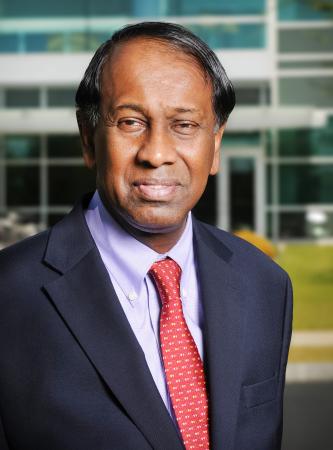Regents’ Professor Ajit P. Yoganathan, renowned for his work with cardiovascular technologies, will retire - effective June 1, 2020 - from his joint appointments in Georgia Tech’s Wallace H. Coulter Department of Biomedical Engineering (BME) and the School of Chemical & Biomolecular Engineering (ChBE). Yoganathan, a founding member of the Coulter Department, is also a founding member of Petit Institute of Bioengineering and Bioscience at Georgia Tech.
For his achievements improving the biomechanics of prosthetic heart valves and the development of heart repair devices, Yoganathan was elected to the National Academy of Engineering (NAE) in 2015. This is among the highest professional distinctions accorded to an engineer, and one of many Yoganathan has received, his most recent being an inaugural honorary fellowship from the American Association of Thoracic Surgeons (AATS).
After earning his PhD from the California Institute of Technology, Yoganathan joined the faculty of Georgia Tech in 1979, founding the Cardiovascular Fluid Mechanics (CFM) Lab that same year. In this lab, Yoganathan invented the science of prosthetic heart valve engineering.
Over the past four decades, he has made profound research contributions to native and artificial heart valves, structure function of the left and right sides of the heart, congenital heart diseases, and developing minimally invasive cardiovascular interventions. All prosthetic heart valves implanted in the U.S. – more than two dozen valve designs - have been studied and evaluated in Yoganathan’s lab.
Known by the nickname “Dr. Y,” Yoganathan, along with his collaborators, expanded cardiovascular knowledge beyond valves with years of flow and physiology data collected with ultrasound and magnetic resonance imaging, modeling, and computer simulation. This work led to innovative planning software for challenging surgeries in babies and children born with serious heart/cardiac birth defects.
“There’s no part of the world that I go to where people don’t know of him,” said Pedro del Nido, professor of child surgery at Harvard Medical School and chairman of cardiovascular surgery at Boston Children’s Hospital, in a Georgia Tech Research Horizons feature story on Yoganathan earlier this year.
That article, titled “King of Hearts,” also quotes Phil Ebeling, retired chief technology officer at medical giant, Abbott Laboratories, who said of Yoganathan, “There just aren’t many people, frankly, in any industry with such universal name recognition and integrity.”
With innumerable accolades and titles to his credit, Yoganathan was named a Regents’ professor in 1994 and appointed to the prestigious Wallace H. Coulter Distinguished Faculty Chair in Biomedical Engineering 2004.
In his CFM Lab, he mentored more than 50 doctoral students, 35 master's students, and 40 post-doctoral trainees through the years.
Yoganathan has also published more than 450 peer-reviewed journal articles and 40 book chapters in leading biomedical journals and books.
For his contributions to the field of bioengineering, Yoganathan received the H.R. Lissner Award in Bioengineering from the American Society of Mechanical Engineers in 1997. In 2005, he was awarded the Theo Pilkington Award for his contributions to biomedical engineering education by the American Society of Engineering Education. In 2012, the Biomedical Engineering Society bestowed Dr. Yoganathan the Pritzker Lecturer Award, the highest honor given to a BMES member.
It was del Nido who notified Yoganathan of his latest honor, from AATS, which Yoganathan called, "an honor beyond my wildest dreams, which would not have been possible without the dedicated contributions of more than 130 PLUS graduate students and post-doctoral trainees of the CFM lab." He was inducted at the 100th annual meeting of the AATS (held virtually, May 22-23).
“Ajit leaves a remarkably impactful legacy on the field of cardiovascular research, and locally on our Coulter Department of Biomedical Engineering,” said Professor Susan Margulies, the Wallace H. Coulter Chair of BME.
“He is a visionary member of our Coulter BME family, who was our first associate chair in translational research, launched our Master’s in Biomedical Innovation and Development, forged lasting relationships between our department and industry, and established an exemplar model for our Awards Committee. Ajit’s wisdom and generosity has touched us all and we are deeply grateful. Fortunately, with two recent NIH awards, Ajit will return to campus as an emeritus faculty member with an active research program.“
Professor David Sholl, the John F. Brock III School Chair of ChBE, said: “Ajit began his 40 year career at Georgia Tech in Chemical Engineering, which was his academic home for over 20 years until he became a founding member of what is now the Wallace H. Coulter Department of Biomedical Engineering. In his career, Ajit served the Georgia Tech community in many ways, was an outstanding mentor to many graduate students and made technology and translational advances that have directly improved the lives of patients around the world. I am pleased to congratulate him.”
Media Contact:
Walter Rich
Communications Manager
Wallace H. Coulter Department of Biomedical Engineering
Georgia Institute of Technology
Media Contact
Walter Rich
Keywords
Latest BME News
Jo honored for his impact on science and mentorship
The department rises to the top in biomedical engineering programs for undergraduate education.
Commercialization program in Coulter BME announces project teams who will receive support to get their research to market.
Courses in the Wallace H. Coulter Department of Biomedical Engineering are being reformatted to incorporate AI and machine learning so students are prepared for a data-driven biotech sector.
Influenced by her mother's journey in engineering, Sriya Surapaneni hopes to inspire other young women in the field.
Coulter BME Professor Earns Tenure, Eyes Future of Innovation in Health and Medicine
The grant will fund the development of cutting-edge technology that could detect colorectal cancer through a simple breath test
The surgical support device landed Coulter BME its 4th consecutive win for the College of Engineering competition.








